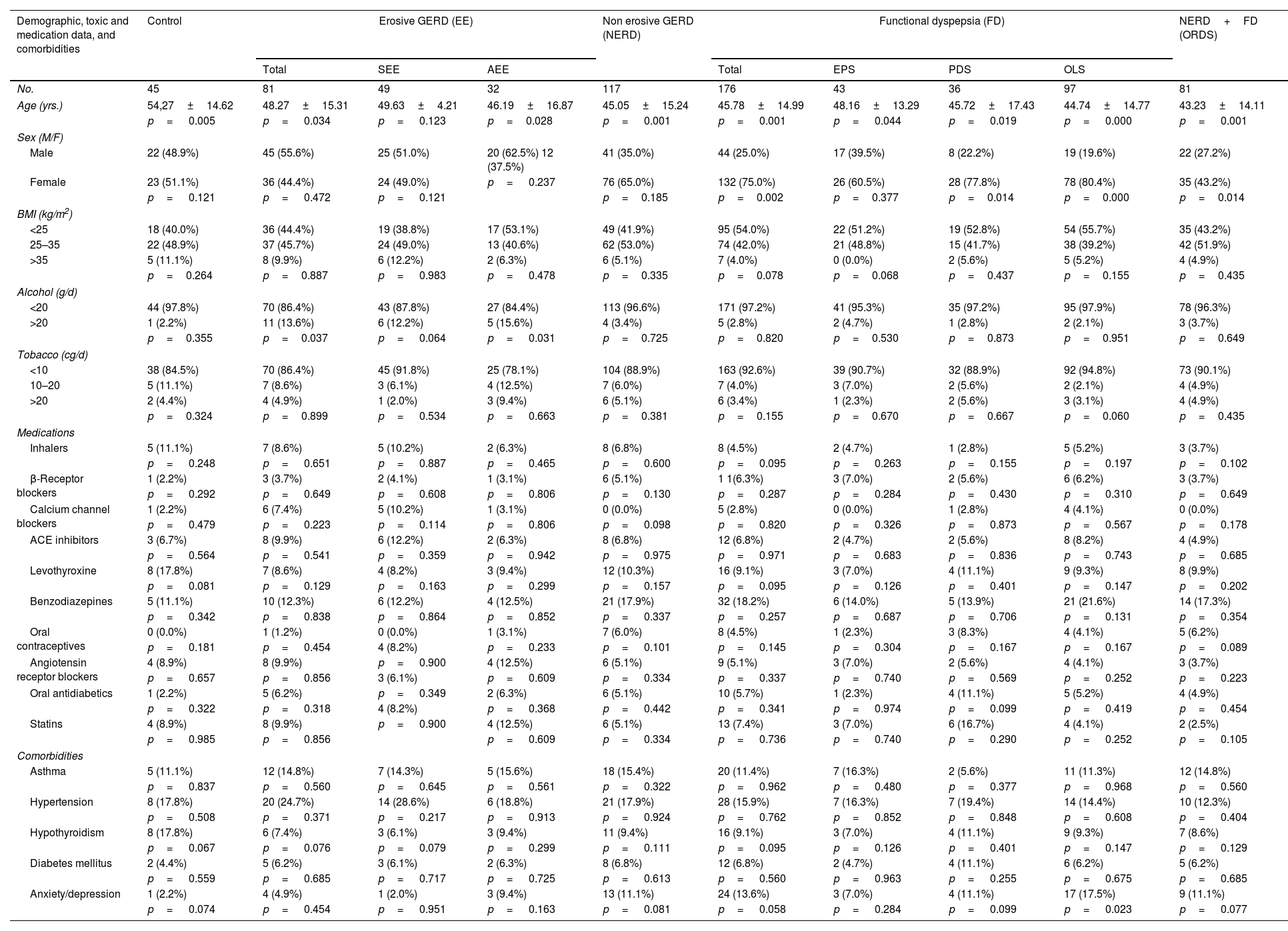Conflicting data exists regarding risk factors associated with Gastroesophageal Reflux Disease (GERD) and Functional Dyspepsia (FD). Few studies examine anxiety/depression in relation to GERD phenotypes (Esophagitis/EE, and Non-Erosive Reflux Disease/NERD), FD, and Rome-IV syndromes. Our aim was to evaluate the association between epidemiological factors and comorbidities with GERD phenotypes, FD, and Rome-IV syndromes, as well as their relationship with anxiety/depression.
Methods338 subjects were selected from 357 patients referred to three tertiary-centers for endoscopic evaluation. Every subject was interviewed individually to administer three validated questionnaires: GERD-Q, Rome-IV and HADS.
Results45/338 patients were controls, 198/58.6% classified as GERD, 81/24.0% EE (49/14.5% symptomatic, and 32/9.5% asymptomatic), 117/34.6% NERD, 176/52.1% FD (43/12.7% epigastric pain syndrome, 36/10.7% postprandial distress syndrome, and 97/28.7% overlapping syndrome). 81 patients were mixed GERD-FD. Multivariate analysis found significant independent associations: age in NERD and FD; sex in EE, asymptomatic EE and FD; body mass index in NERD and FD; alcohol in EE; anxiety/depression in FD; use of calcium channel antagonists in EE; and inhalers in FD. We compared controls vs different groups/subgroups finding significantly more anxiety in NERD, FD, all Rome-IV syndromes, and mixed GERD-FD; more depression in FD, overlapping syndrome, and mixed GERD-FD; and higher levels of anxiety+depression in NERD, FD, overlapping syndrome, and mixed GERD-FD.
ConclusionsNERD and FD share demographic and psychopathological risk factors which suggests that they may form part of the same pathophysiological spectrum. Regarding NERD anxiety was predominant, and in FD anxiety+depression, suggesting that both processes may require complementary psychological therapy.
Existen datos controvertidos sobre los factores de riesgo asociados a la enfermedad por reflujo gastroesofágico (ERGE) y la dispepsia funcional (DF). Pocos estudios han evaluado la relación entre ansiedad/depresión y los diferentes fenotipos de la DF (criterios Roma IV) y de la ERGE (erosiva [EE] y no erosiva [NERD]). Nuestro objetivo fue valorar la asociación entre diferentes factores epidemiológicos y comorbilidades y los fenotipos de la ERGE, la DF y sus síndromes, y su relación con la ansiedad/depresión.
MétodosSe seleccionaron 338 pacientes entre 357 remitidos para estudio endoscópico en 3 hospitales terciarios. Cada uno fue entrevistado individualmente y completó 3 cuestionarios validados: GERD-Q, Roma IV y HADS.
ResultadosCuarenta y cinco de los 338 pacientes fueron controles. Se clasificaron 198/58,6% como ERGE, 81/24,0% como EE (49/14,5% sintomática y 32/9,5% asintomática), 117/34,6% como NERD y 176/52,1% como DF (43/12,7% síndrome de dolor epigástrico, 36/10,7% síndrome de molestias posprandiales y 97/28,7% solapamiento epigastralgia-molestias posprandiales). Ochenta y uno solapaban ERGE-DF. El análisis multivariante encontró las siguientes asociaciones significativas: edad en NERD y DF; sexo en EE, EE asintomática y DF; IMC en NERD y DF; alcohol en EE; ansiedad/depresión en DF; toma de antagonistas del calcio en EE e inhaladores en DF. Al comparar el grupo control vs. diferentes grupos/subgrupos encontramos significativamente más ansiedad en NERD, solapamiento DF-ERGE, DF y todos sus síndromes Roma IV; más depresión en DF, solapamientos epigastralgia-molestias posprandiales y ERGE-DF; y más ansiedad+depresión en NERD, DF y solapamientos epigastralgia-molestias posprandiales y ERGE-DF.
ConclusionesLa DF y la NERD comparten factores de riesgo demográficos y psicopatológicos, lo que evidencia que forman parte de un mismo espectro fisiopatológico. En la NERD predomina la ansiedad y en la DF la ansiedad+depresión, apuntando a que ambos procesos podrían precisar terapia psicológica complementaria.
Artículo
Comprando el artículo el PDF del mismo podrá ser descargado
Precio 19,34 €
Comprar ahora















